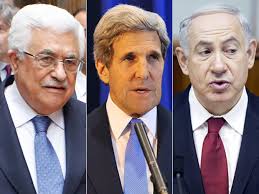 U.S. Secretary of State John Kerry urged Israel on Wednesday to limit settlement building in occupied territories to help push peace talks with the Palestinians back on track.
U.S. Secretary of State John Kerry urged Israel on Wednesday to limit settlement building in occupied territories to help push peace talks with the Palestinians back on track.
Faced with grim Israeli and Palestinian assessments of progress in the talks, Kerry also appeared to slap down Israeli Prime Minister Benjamin Netanyahu and warmly endorsed Palestinian President Mahmoud Abbas’s commitment to seeking a two-state solution.
Friction over the talks has risen this past week on the back of Israeli plans, announced in tandem with its release of 26 Palestinian prisoners, for some 3,500 new homes for Jewish settlers in the occupied West Bank and East Jerusalem.
“Let me emphasize at this point the position of the United States of America on the settlements is that we consider them… to be illegitimate,” Kerry, reaffirming long-standing U.S. policy, said after discussions with Abbas.
Speaking to reporters in the West Bank town of Bethlehem, Kerry said it would be better if settlement building was “limited as much as possible in an effort to help create a climate for these talks to be able to proceed effectively”.
Palestinians have warned of a brewing crisis if Israel continues to assert that they had effectively agreed to turn a blind eye to the settlement campaign, in exchange for the progressive release of 104 long-serving inmates.
Kerry dismissed Israeli suggestions there had been an understanding with the Palestinians about settlement expansion and stated “unequivocally” his belief that Abbas was “100 percent committed” to peace talks.
“I want to make it extremely clear that at no time did the Palestinians in any way agree as a matter of going back to the talks, that they somehow condone or accept the settlements,” he said.
In Jerusalem earlier, Netanyahu had said the U.S.-brokered negotiations had failed to make any real progress.
Speaking to reporters with a stone-faced Kerry at his side, Netanyahu accused the Palestinians of creating “artificial crises” and of trying to “run away from the historic decisions that are needed to make a genuine peace”.
Hours later, Kerry said Abbas “wants to try peace and he understands it requires compromise by all the parties”.
The chief U.S. diplomat, citing “difficulties” in the peace process, had said earlier in Jerusalem that the United States was convinced that Netanyahu was also determined to pursue an end to the decades-old Israeli-Palestinian conflict.
“As in any negotiation there will be moments of up and moments of down, and it goes back and forth,” Kerry said.
Kerry, whose shuttle diplomacy helped to revive the talks last July after a three-year break, has set a nine-month schedule for an agreement, despite widespread scepticism.
PALESTINIAN FRUSTRATION
Few details have emerged from the negotiations, held at unannounced times and at secret locations in line with pledges to keep a lid on leaks.
But Palestinian officials have been airing frustration over a lack of movement on core issues such as the borders of a Palestinian state, security arrangements, the future of Israeli settlements and the fate of Palestinian refugees.
Abbas, in a speech on Monday, said that despite all the meetings nothing had changed on the ground.
Netanyahu said he hoped Kerry’s visit would “help steer (the negotiations) back to a place where we could achieve the historical peace that we seek”.
Israeli settlements in the West Bank and East Jerusalem, territories it captured in the 1967 Middle East war and which Palestinians seek for a state along with the Hamas Islamist-run Gaza Strip, are considered illegal by most countries.
Israel cites historical and biblical links to the land, where more than 500,000 Israelis now live alongside 2.5 million Palestinians.
In another development, Netanyahu said former Israeli Foreign Minister Avigdor Lieberman would return to the cabinet after his acquittal in a corruption trial on Wednesday.
The right-wing powerbroker is a hardliner on Palestinian peace talks, which he has said have no chance of succeeding.
In the Gaza Strip, Hamas spokesman Sami Abu Zuhri said any deal reached by Abbas, a rival of the Islamist group, “would not be binding on our people”.
Reuters

Leave a Reply
You must be logged in to post a comment.